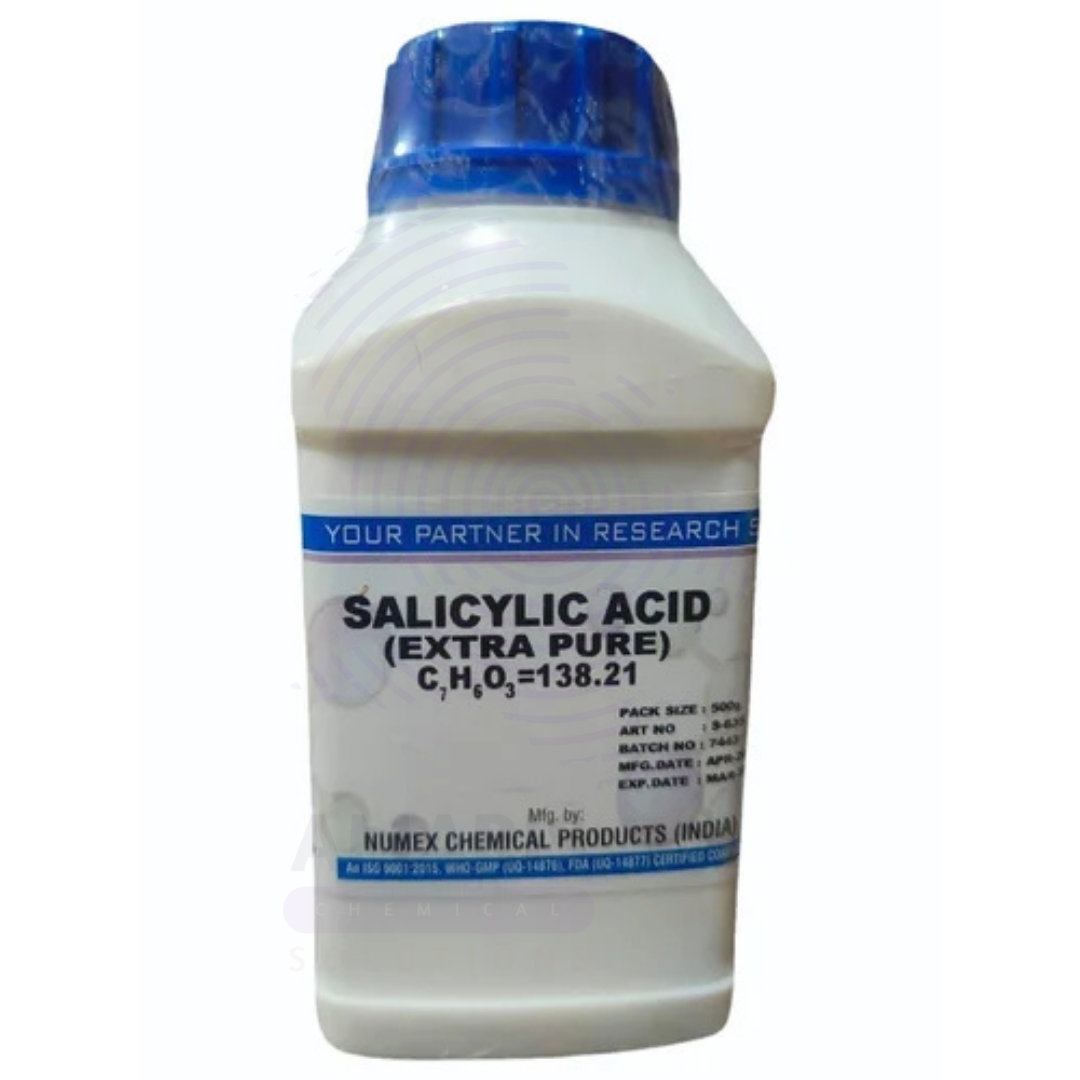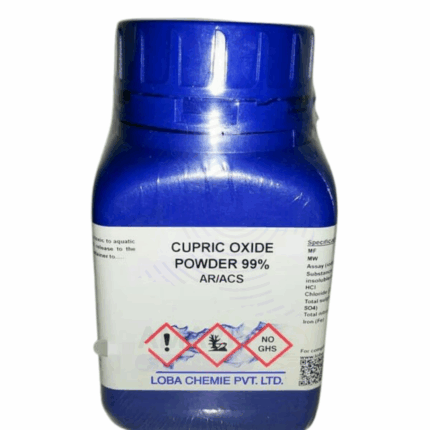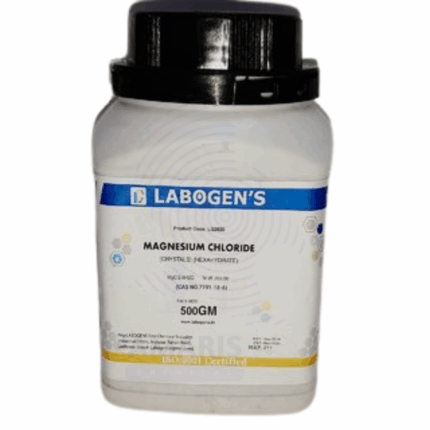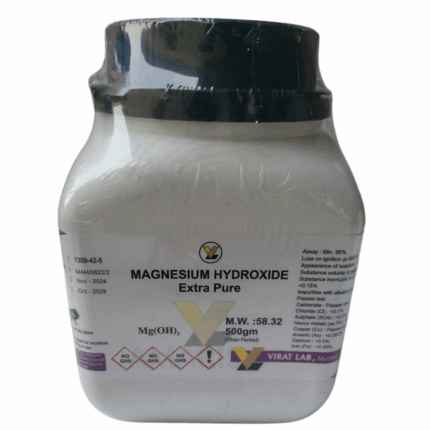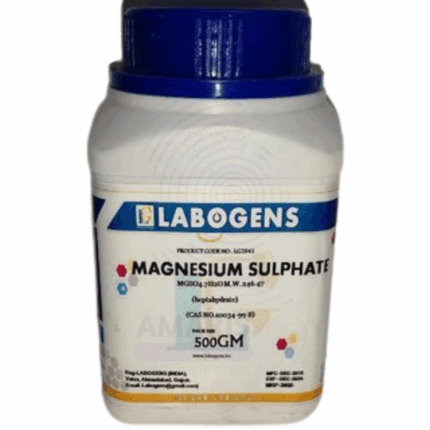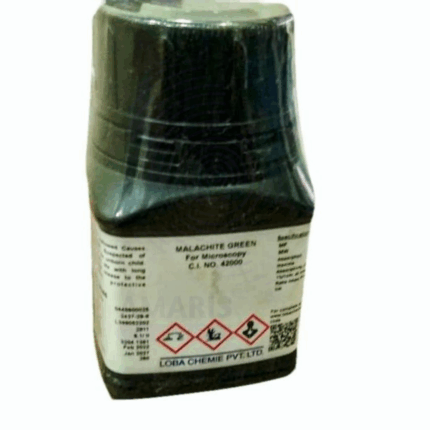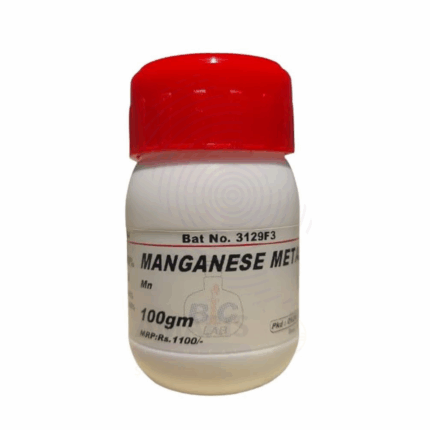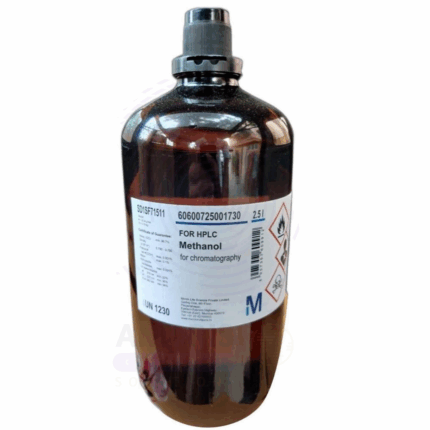
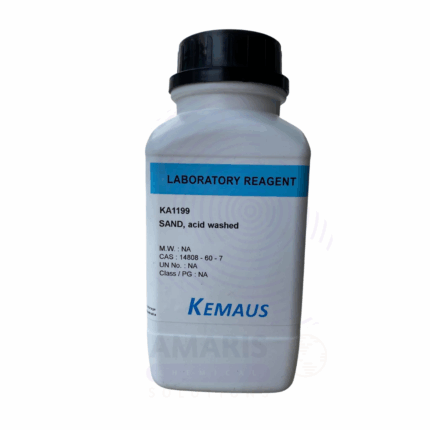
Salicylic Acid Extra Pure
$ 19.00 Original price was: $ 19.00.$ 18.76Current price is: $ 18.76.
Salicylic Acid Extra Pure is a white crystalline powder with the chemical formula C7H6O3, widely recognized for its use as a key pharmaceutical intermediate and topical treatment agent. It possesses keratolytic, anti-inflammatory, and antiseptic properties making it essential in acne and psoriasis formulations. In laboratory applications, it serves as a chemical reagent for organic synthesis and analysis. Its solubility in organic solvents and moderate acidity enable it to be versatile across pharmaceutical, cosmetic, and chemical industries. The Extra Pure grade ensures high purity suitable for research, pharmaceutical, and cosmetic use. Proper storage in a cool, dry place away from incompatible substances preserves its quality and effectiveness. Handling precautions include avoiding inhalation and skin contact due to its irritant nature.
Salicylic Acid Extra Pure
PRIMARY USES
Analytical Reagent & Laboratory Applications:
- Used extensively as a standard in chemical analysis and synthesis.
- Serves as an important intermediate in pharmaceutical research and formulation.
- Utilized for synthesis of salicylates and other organic compounds in laboratories.
Pharmaceutical & Cosmetic Industry:
- Functions as an active ingredient in topical acne and psoriasis treatments due to keratolytic properties.
- Used in ointments, creams, and lotions to reduce inflammation and exfoliate skin.
- Employed in hair care products for dandruff control.
SECONDARY USES
Food Industry (in regulated quantities):
- Occasionally used as a preservative and antimicrobial agent in certain food products.
- Acts as a flavoring agent in some beverages and confectioneries.
Chemical Industry:
- Used in dye and pigment synthesis.
- Intermediate for synthesis of aspirin and other pharmaceuticals.
- Utilized in rust removal and metal cleaning agents.
-
Basic Identification Attributes
Chemical Name: Salicylic Acid
CAS Number: 69-72-7
HS Code: 2918.15.00
Molecular Formula: C7H6O3
Synonyms:
- 2-Hydroxybenzoic acid
- Ortho-hydroxybenzoic acid
-
Physical & Chemical Properties
Physical State: White crystalline powder
Color & Odor: White to off-white, faint odor
Melting Point & Boiling Point:
- Melting Point: 159 °C (decomposes)
- Boiling Point: Sublimes without melting
Density/Specific Gravity: ~1.44 g/cm³
Solubility: - Slightly soluble in water (2 g/L at 20 °C)
- Soluble in ethanol, ether, and acetone
pH Level: Weakly acidic (pKa ~2.97)
Vapor Pressure & Volatility: Low volatility
Flash Point: Not applicable
Autoignition Temperature: Not applicable
Viscosity: Not applicable
-
Safety & Hazard Attributes
Hazard Class (GHS Classification):
- Skin irritation (Category 2)
- Eye irritation (Category 2A)
- Specific target organ toxicity (single exposure)
NFPA Ratings: - Health: 2
- Flammability: 1
- Reactivity: 0
Exposure Limits: - OSHA PEL: Not established
- ACGIH TLV: Not established
Reactivity: - Stable under normal conditions
- Reacts with strong bases to form salts
-
Storage & Handling Attributes
Storage Conditions:
- Store in a cool, dry, well-ventilated place away from direct sunlight
- Keep container tightly closed
Incompatible Materials: - Strong bases
- Oxidizing agents
Container Type: - Glass or polyethylene containers recommended
Shelf Life & Expiration Date: - Stable for several years if stored properly
Special Handling Requirements: - Use gloves, goggles, and protective clothing
- Avoid inhaling dust
-
Regulatory & Compliance Attributes
Regulatory Status:
- Approved for pharmaceutical and cosmetic use (USP, EP)
- Listed under REACH, OSHA, and EPA inventories
Transportation Restrictions: - Not classified as hazardous for transport
Waste Disposal Method: - Dispose according to local environmental regulations
- Considered non-hazardous waste under normal handling
-
Environmental & Health Impact
Ecotoxicity:
- Moderate toxicity to aquatic organisms
Persistence in Environment: - Degrades under aerobic conditions
Carcinogenicity/Mutagenicity: - Not classified as carcinogenic or mutagenic
Biodegradability: - Readily biodegradable
SAFETY PRECAUTIONS
Personal Protective Equipment (PPE):
- Wear chemical-resistant gloves (e.g., nitrile or butyl rubber).
- Use safety goggles or face shield to prevent eye contact.
- Wear lab coat or protective clothing.
- If dust is generated, use a suitable dust mask or respirator.
Handling:
- Handle in a well-ventilated area.
- Avoid contact with skin, eyes, and clothing.
- Do not breathe dust.
- Wash hands thoroughly after handling.
Storage:
- Store in a tightly sealed container.
- Keep in a dry, cool, well-ventilated place.
- Protect from moisture and incompatible materials such as strong bases and oxidizing agents.
FIRST AID MEASURES
Inhalation:
- Move to fresh air immediately.
- Seek medical attention if breathing becomes difficult.
Skin Contact:
- Wash thoroughly with soap and water.
- Remove contaminated clothing.
- Seek medical advice if irritation occurs.
Eye Contact:
- Rinse immediately with plenty of water for at least 15 minutes.
- Keep eyelids open during rinsing.
- Seek medical attention promptly.
Ingestion:
- Rinse mouth with water.
- Do not induce vomiting unless advised by medical personnel.
- Seek medical attention if symptoms appear.
FIRE FIGHTING MEASURES
Flammability:
- Slightly combustible solid.
Extinguishing Media:
- Use water spray, foam, dry chemical, or CO₂.
Hazardous Combustion Products:
- May produce carbon monoxide, carbon dioxide, and phenolic fumes.
Firefighter Protection:
- Wear self-contained breathing apparatus (SCBA) and full protective gear.
- Avoid inhaling any thermal decomposition products.


 Preservatives(food)
Preservatives(food) Flavor Enhancers
Flavor Enhancers Acidulants
Acidulants Sweeteners
Sweeteners Antioxidants
Antioxidants Colorants(food)
Colorants(food) Nutraceutical Ingredients (food)
Nutraceutical Ingredients (food) Nutrient Supplements
Nutrient Supplements Emulsifiers
Emulsifiers
 Collectors
Collectors Dust Suppressants
Dust Suppressants Explosives and Blasting Agents
Explosives and Blasting Agents Flocculants and Coagulants
Flocculants and Coagulants Frothers
Frothers Leaching Agents
Leaching Agents pH Modifiers
pH Modifiers Precious Metal Extraction Agents
Precious Metal Extraction Agents
 Antioxidants(plastic)
Antioxidants(plastic) Colorants (Pigments, Dyes)
Colorants (Pigments, Dyes) Fillers and Reinforcements
Fillers and Reinforcements Flame Retardants
Flame Retardants Monomers
Monomers Plasticizers
Plasticizers Polymerization Initiators
Polymerization Initiators Stabilizers (UV, Heat)
Stabilizers (UV, Heat)
 Antifoaming Agents
Antifoaming Agents Chelating Agents
Chelating Agents Coagulants and Flocculants
Coagulants and Flocculants Corrosion Inhibitors
Corrosion Inhibitors Disinfectants and Biocides
Disinfectants and Biocides Oxidizing Agents
Oxidizing Agents pH Adjusters
pH Adjusters Scale Inhibitors( water)
Scale Inhibitors( water)
 Antioxidants(cosmetic)
Antioxidants(cosmetic) Emollients
Emollients Fragrances and Essential Oils
Fragrances and Essential Oils Humectants
Humectants Preservatives
Preservatives Surfactants(cosmetic)
Surfactants(cosmetic) Thickeners
Thickeners UV Filters
UV Filters
 Fertilizers
Fertilizers Soil Conditioners
Soil Conditioners Plant Growth Regulators
Plant Growth Regulators Animal Feed Additives
Animal Feed Additives Biostimulants
Biostimulants Pesticides (Herbicides, Insecticides, Fungicides)
Pesticides (Herbicides, Insecticides, Fungicides)
 Active Pharmaceutical Ingredients (APIs)
Active Pharmaceutical Ingredients (APIs) Excipients
Excipients Solvents(pharmaceutical)
Solvents(pharmaceutical) Antibiotics
Antibiotics Antiseptics and Disinfectants
Antiseptics and Disinfectants Vaccine Adjuvants
Vaccine Adjuvants Nutraceutical Ingredients (pharmaceutical)
Nutraceutical Ingredients (pharmaceutical) Analgesics & Antipyretics
Analgesics & Antipyretics
 Analytical Reagents
Analytical Reagents Solvents(lab)
Solvents(lab) Chromatography Chemicals
Chromatography Chemicals Spectroscopy Reagents
Spectroscopy Reagents microbiology-and-cell-culture-reagents
microbiology-and-cell-culture-reagents Molecular Biology Reagents
Molecular Biology Reagents Biochemical Reagents
Biochemical Reagents Inorganic and Organic Standards
Inorganic and Organic Standards Laboratory Safety Chemicals
Laboratory Safety Chemicals Specialty Laboratory Chemicals(Special Laboratory Equipment)
Specialty Laboratory Chemicals(Special Laboratory Equipment)
 Demulsifiers
Demulsifiers Hydraulic Fracturing Fluids
Hydraulic Fracturing Fluids Scale Inhibitors(oil)
Scale Inhibitors(oil) Surfactants(oil)
Surfactants(oil) Drilling Fluids
Drilling Fluids
 Dyes and Pigments
Dyes and Pigments Bleaching Agents
Bleaching Agents Softening Agents
Softening Agents Finishing Agents
Finishing Agents Antistatic Agents
Antistatic Agents
 Admixtures
Admixtures Waterproofing Agents
Waterproofing Agents Sealants and Adhesives
Sealants and Adhesives Curing Compounds
Curing Compounds Concrete Repair Chemicals
Concrete Repair Chemicals Anti-Corrosion Coatings
Anti-Corrosion Coatings
 Surfactants(cleaning)
Surfactants(cleaning) Builders
Builders Enzymes
Enzymes Solvents (Cleaning)
Solvents (Cleaning) Fragrances
Fragrances
 Electronic Chemicals
Electronic Chemicals Catalysts
Catalysts Lubricants
Lubricants Photographic Chemicals
Photographic Chemicals Refrigerants
Refrigerants Automotive chemicals
Automotive chemicals Pyrotechnic Chemicals
Pyrotechnic Chemicals
 Biodegradable Surfactants
Biodegradable Surfactants Bio-based Solvents
Bio-based Solvents Renewable Polymers
Renewable Polymers Carbon Capture Chemicals
Carbon Capture Chemicals Wastewater Treatment Chemicals
Wastewater Treatment Chemicals
 Pigments
Pigments Solvents(paint)
Solvents(paint) Specialty Coatings
Specialty Coatings Binders/Resins
Binders/Resins Additives
Additives Driers
Driers Anti-Corrosion Agents
Anti-Corrosion Agents Functional Coatings
Functional Coatings Application-Specific Coatings
Application-Specific Coatings
 Fresh Herbs
Fresh Herbs Ground Spices
Ground Spices Whole Spices
Whole Spices Spice Blends
Spice Blends Dried Herbs
Dried Herbs
 Leavening Agents
Leavening Agents Dough Conditioners
Dough Conditioners Flour Treatments
Flour Treatments Fat Replacers
Fat Replacers Decoratives
Decoratives Preservatives(baking)
Preservatives(baking)
 Plasticizers & Softeners
Plasticizers & Softeners Reinforcing Agents
Reinforcing Agents Adhesion Promoters
Adhesion Promoters Vulcanizing Agents
Vulcanizing Agents Antidegradants
Antidegradants Blowing Agents
Blowing Agents Fillers & Extenders
Fillers & Extenders Accelerators & Retarders
Accelerators & Retarders